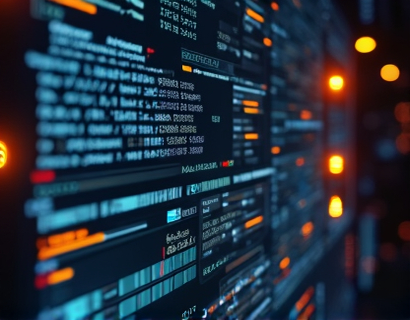Crypto-Powered Innovations: Leveraging AI for Next-Gen FinTech Solutions
The intersection of cryptocurrency and artificial intelligence (AI) is giving birth to a new era of financial technology (FinTech) solutions. This convergence is not just a trend but a transformative shift that is redefining the digital landscape. For tech enthusiasts and innovators, understanding these advancements is crucial as they hold the key to the future of finance. This article explores the cutting-edge FinTech solutions that are emerging from the synergy of crypto and AI, offering insights into how these technologies are reshaping the financial industry.
Understanding the Basics: Cryptocurrency and AI
Before diving into the innovations, it's essential to grasp the fundamentals of cryptocurrency and AI. Cryptocurrency, a digital or virtual currency, uses cryptography for security and operates on a decentralized network, typically a blockchain. This technology ensures transparency, security, and reduces the need for intermediaries.
Artificial intelligence, on the other hand, involves the simulation of human intelligence processes by machines, particularly computer systems. These processes include learning (the acquisition of information and rules for using it), reasoning (using rules to reach approximate or definite conclusions), and self-correction. When combined, these technologies can create powerful tools for FinTech.
The Synergy of Crypto and AI in FinTech
The integration of AI with cryptocurrency has led to the development of sophisticated FinTech solutions. One of the primary areas where this synergy is evident is in smart contracts. Smart contracts are self-executing contracts with the terms of the agreement directly written into code. AI can enhance smart contracts by adding layers of complexity and adaptability, making them more efficient and secure. For instance, AI can predict and respond to various scenarios, ensuring that the contract executes under optimal conditions.
Another significant area is decentralized finance (DeFi). DeFi platforms aim to create financial systems that are open, permissionless, and accessible to everyone. AI can optimize DeFi protocols by analyzing vast amounts of data to improve risk assessment, fraud detection, and algorithmic trading. This not only enhances the efficiency of DeFi but also makes it more robust and user-friendly.
Enhanced Security Through AI
Security is a paramount concern in the crypto space. Traditional security measures often fall short against sophisticated cyber threats. AI-driven security solutions are revolutionizing how FinTech platforms protect user assets. Machine learning algorithms can detect anomalies and patterns indicative of fraudulent activities in real-time, providing a proactive defense mechanism. Additionally, AI can enhance the security of blockchain itself by identifying vulnerabilities and improving consensus mechanisms.
Identity verification is another critical aspect where AI shines. KYC (Know Your Customer) processes can be streamlined using AI to verify identities more accurately and efficiently. This not only reduces the risk of identity theft and fraud but also simplifies the onboarding process for users, making FinTech services more accessible.
Personalized Financial Services
The combination of crypto and AI enables the creation of highly personalized financial services. AI algorithms can analyze user data to provide tailored investment advice, risk management strategies, and financial planning. For instance, AI-powered robo-advisors can manage crypto portfolios, adjusting asset allocations based on market conditions and user preferences. This level of personalization enhances user experience and increases the effectiveness of financial solutions.
Moreover, AI can help in predictive analytics, forecasting market trends and user behavior. This foresight allows FinTech platforms to offer proactive services, such as alerting users to potential market movements or suggesting optimal times for transactions. Such capabilities are particularly valuable in the volatile crypto market, where timing can significantly impact returns.
Efficient Trade Execution
Trading in the crypto market can be fast-paced and complex. AI-driven trading bots can execute trades at optimal times, taking into account a multitude of factors such as market sentiment, historical data, and real-time news feeds. These bots can operate 24/7 without human intervention, ensuring that trades are executed with precision and speed. This not only improves the efficiency of trading but also reduces emotional biases that can lead to suboptimal decisions.
Additionally, AI can enhance order matching and execution algorithms. By analyzing vast datasets, AI can match buy and sell orders more effectively, reducing slippage and improving the overall trading experience. This is particularly beneficial in decentralized exchanges (DEXs) where liquidity and execution quality are crucial.
Cross-Chain Interoperability
One of the challenges in the crypto ecosystem is the lack of interoperability between different blockchain networks. AI can play a pivotal role in addressing this issue by developing smart bridges and protocols that enable seamless communication and asset transfer between chains. This interoperability is essential for building a unified and efficient financial system.
AI algorithms can analyze the compatibility and efficiency of different blockchain protocols, suggesting optimal solutions for cross-chain transactions. This not only enhances the functionality of individual platforms but also contributes to the overall growth and adoption of blockchain technology in finance.
Regulatory Compliance and Transparency
Regulatory compliance is a significant challenge for FinTech companies, especially in the crypto space. AI can help navigate the complex regulatory landscape by providing real-time monitoring and compliance checks. Machine learning models can analyze regulatory changes and update compliance protocols accordingly, ensuring that FinTech platforms remain compliant with evolving laws and standards.
Transparency is another area where AI can make a significant impact. Blockchain's inherent transparency can be augmented with AI to provide users with clear and understandable insights into transactions and operations. This not only builds trust but also helps in meeting regulatory requirements for transparency and accountability.
Future Prospects and Challenges
The future of crypto-powered FinTech solutions is promising, with numerous potential applications yet to be explored. However, several challenges need to be addressed to fully realize this potential. One major challenge is the scalability of AI and blockchain technologies. As the number of transactions and data points increases, ensuring that systems remain efficient and responsive is crucial.
Another challenge is the regulatory environment. While AI and crypto offer innovative solutions, they also raise new regulatory questions. Balancing innovation with compliance will be essential for the sustainable growth of these technologies in the financial sector.
Lastly, public perception and adoption remain key factors. Educating users about the benefits and risks of crypto and AI-driven FinTech solutions is vital for widespread adoption. Building trust through transparency, security, and user-friendly interfaces will be essential in driving adoption.
Conclusion
The intersection of cryptocurrency and AI is paving the way for a new generation of FinTech solutions that are more secure, efficient, and personalized. From smart contracts and DeFi to enhanced security and cross-chain interoperability, the potential applications are vast. As these technologies continue to evolve, they will play an increasingly important role in shaping the future of finance. For tech enthusiasts and innovators, staying informed about these developments is crucial for harnessing the full potential of this exciting frontier.










































